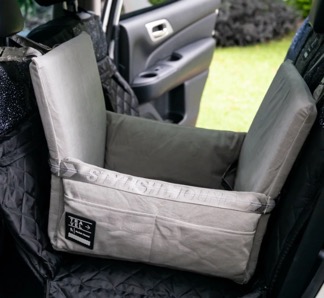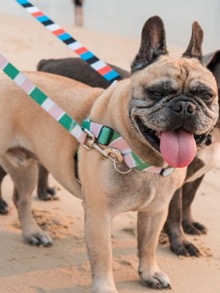How to Pick the Right Dog Car Seat for Your Frenchie
French bulldogs—or Frenchies—are like a fun-sized ball of cuteness as we affectionately refer to them. And if you’re hauling your hot pocket of adorbs across town, you’ll want to make sure they’re protected. Frenchies have a particular body type, and you’ll want to factor this in when choosing their car seat. And when you consider that cars are not designed for four-legged friends, this goes double. There is something out there to suit every pup, and we may just have the solution right here. Here’s how to pick the right dog car seat for your Frenchie.

Back to basics
Before we go any further, let’s go back to basics. When it comes to canine car safety, there are three essential elements: car seat, seat belt, and harness. And when we name these three things, we’re not talking about the OG versions made for humans. We’re talking about canine-specific car seats and seat belts and their harnesses—yes, the ones usually used for walking.
You may be wondering why you’d need such a harness while your Frenchie will be sedentary. Harnesses are fundamental to canine car restraint. If you want to fit a doggy seat belt—which, for the record, is an external ‘add-on’—it needs to attach to its harness. It can’t attach to the car itself like the original version built into the car.

And why a doggy seat belt, you ask? Well, for the same reason, you’d strap your toddler into the car in an H-harness. Cars and their built-in accessories are built for full-sized adults. Little people—or little puppers—will need some extra support to ensure their safety! It’s for this same reason that choosing the right dog car seat (or toddler booster seat) is so important.
Take some measurements
If you’re a Frenchie fan, you’re likely already aware that French bulldogs have a unique body type. Contrary to most other dog breeds, French bulldogs are short and stocky. They’re almost like real-life caricatures—their heads are notably larger than their bodies! Although these generalizations can help, you should still take bodily measurements. This will give you a more accurate idea of what you’re working with.
For the most part, smaller Frenchies will have a chest width of 24–46cm, while larger Frenchies will have chest widths of 48–61cm. To get a more exact reading of your Frenchie’s chest, grab a tape measure and extend it across the widest section of the chest, starting just behind one armpit and finishing just behind the other. Once you have your measurement, adding a few centimeters to the grand total can’t hurt. This will allow for growth and literal wiggle room—just like dog harnesses themselves, which are almost always adjustable.

Once you’ve done that, you’ll want to determine your Frenchie’s neck circumference. All you need to do here is measure their lower neck using a loose tape measure. This may be a simple step, but it’s also critical. Not unlike their pug friends, Frenchies are known for their breathing issues. Ergo, it’s super important that their harness fits over the head and does not clench around the neck.
Pick the right dog car seat
Here we reach the penultimate point of this post. While some people choose to travel without dog car seats, we prefer them for a few reasons. They provide additional restraint, and they also help with travel anxiety. Reminiscent of a cozy, calming dog basket, car seats give shorter doggies—like Frenchies—a little boost. This allows them to see out the car window, which can clarify and effectively reduce car stress.

When choosing a dog car seat, take note of the dimensions and their load-bearing capacities. As a general rule of thumb: if it can fit a Staffy—which weighs 20km on average—it can fit a French bulldog. Of course, Frenchies can weigh anywhere between 9.4–13.7kg, depending on size and sex. This means it has plenty of wiggle room to fit in ye average dog car seat.
Once your dog starts to push 30kg, you might want to forego the doggy seat or see if you can get yours supersized. But this is more a problem if you have a dog about the size of a golden retriever.
Happy travels!
For unique dogs with a unique body type, Frenchies are fairly no-fuss when car travel. This is because those pocket-sized rockets can fit into almost any corner or space! The main thing to bear in mind is their compromised breathing, which means they will be sensitive to tight harnesses around the neck.
If you take nothing else from this post, please remember that a) harnesses need to fit over your Frenchie’s head, and b) harnesses should never have a tight grip around a Frenchie’s neck. Also, if you were thinking of attaching your dog’s seat belt to their collar, please think again. In the event of an accident, a seatbelt-and-collar combination could be a serious choking hazard.
Finally, we recommend a dog car seat for your Frenchie. It will be comforting, calming, and a pleasant source of elevation. Make sure the seat is comfortable, and always check its load-bearing capacity. Nine times out of ten, you should be right. It bears repeating: if it can hold a Staffy, then it can hold your little guy or gal. Now, let’s hit the road!
